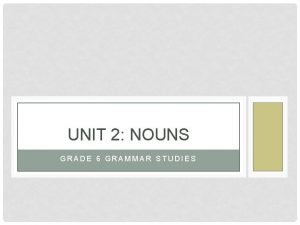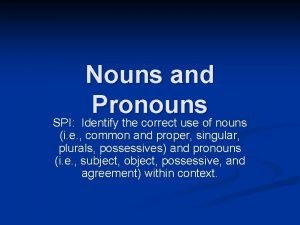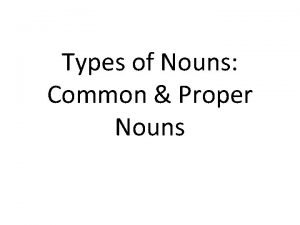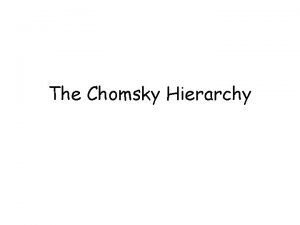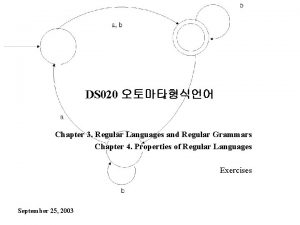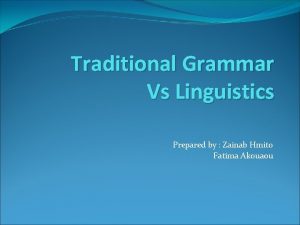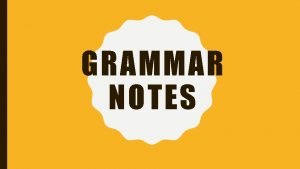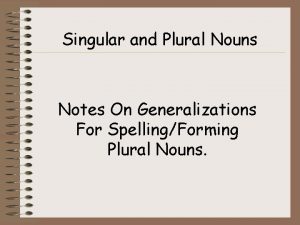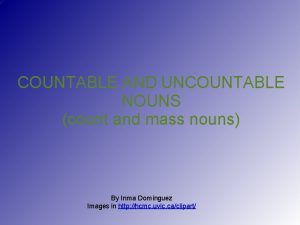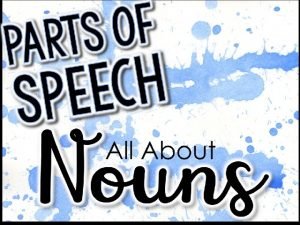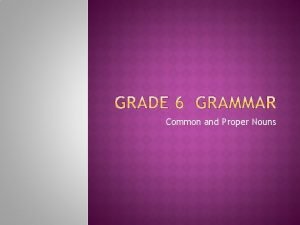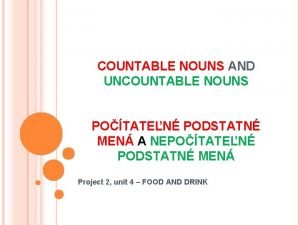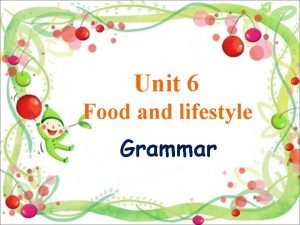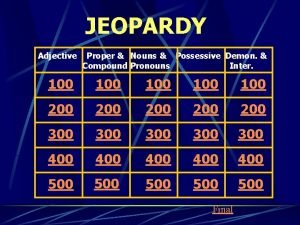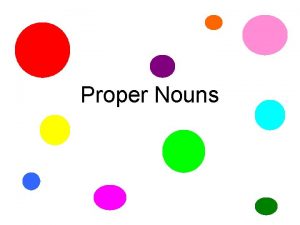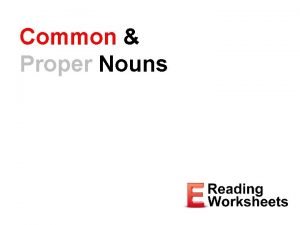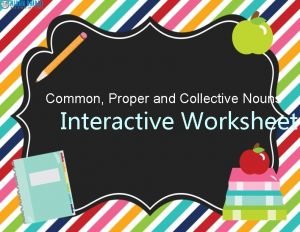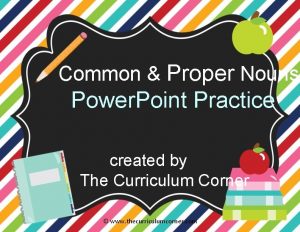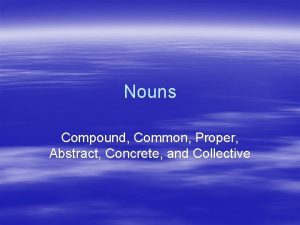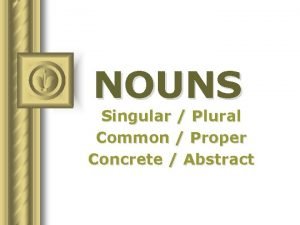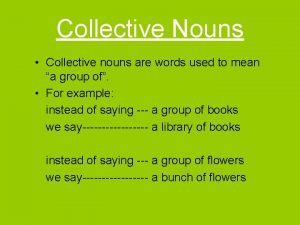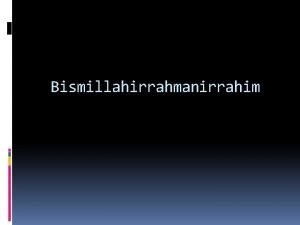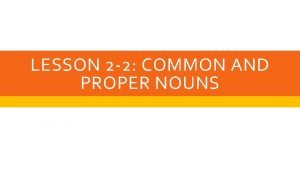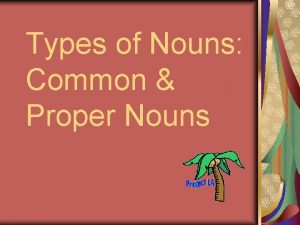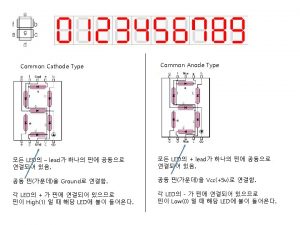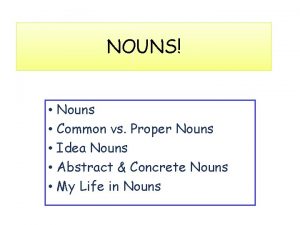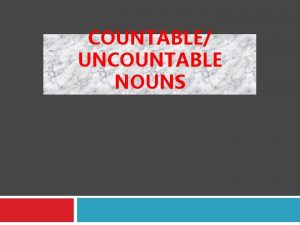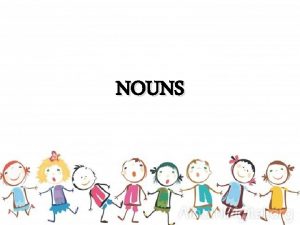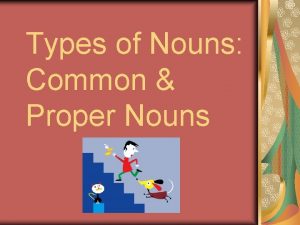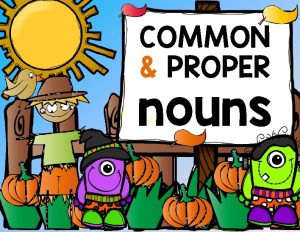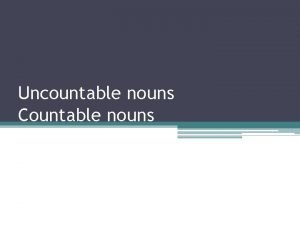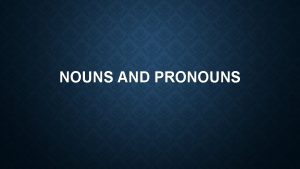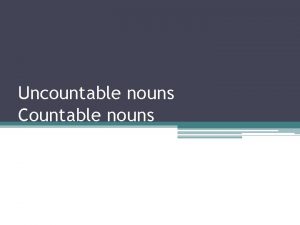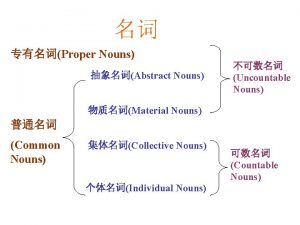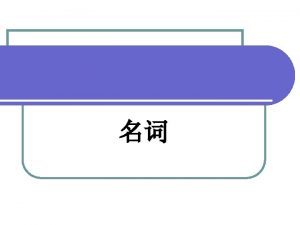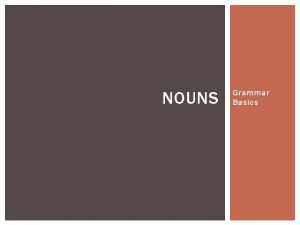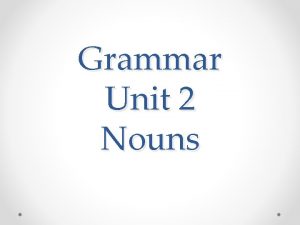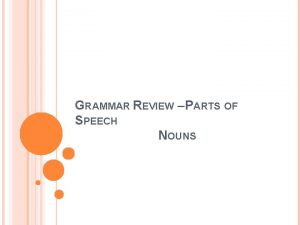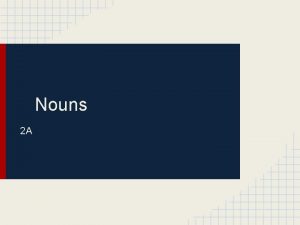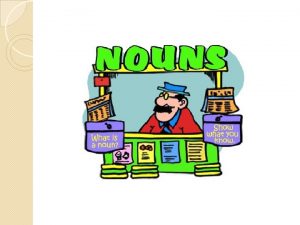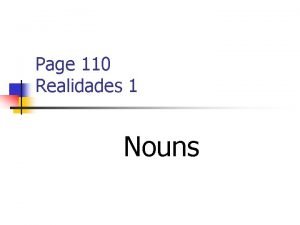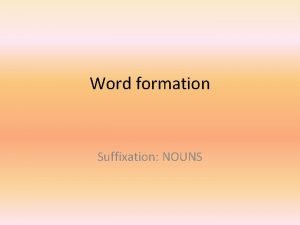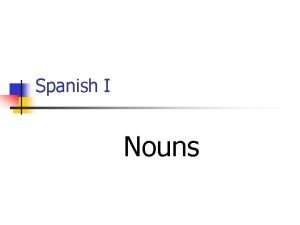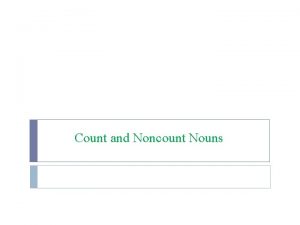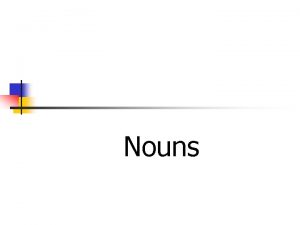GRAMMAR Nouns n o o n Common nouns






























- Slides: 30

GRAMMAR

Nouns n o o n Common nouns begin with a lower case letter and include: Concrete nouns: these are solid objects Abstract nouns: these are not physical eg pride Collective nouns: murder of crows etc Count and uncount nouns: these deal with plurals. You can put an ‘s’ on count nouns, eg dogs. You cannot put an ‘s’ on uncount nouns eg sheep Proper nouns begin with a capital letter and are used for names, towns, titles etc

Application of Nouns Concrete nouns describe solid objects, you can prod them n Abstract nouns tend to denote a more sophisticated writing style. They tend to be concepts and therefore unproddable eg honour, loyalty n Collective nouns are words that signify groups of objects or concepts eg herd, swarm n Context is important; what kind of noun is ‘school’? A noun can change meaning depending on the context n

Modifiers n Generally seen as being adjectives or adverbs but any word or phrase that adds information about a noun or verb is a modifier n If the information precedes the noun/verb it is a premodifier; if after, it is a postmodifier

Important table of pronouns Person Singular Plural subject object First I Second You, thee You thou (familiar) You Third He/she/it Him/her/i They t Them Me We Us

Demonstrative pronoun n Demonstrating where the object is- pointing at it n Relies on context n Those, that and them come under this category as they demonstrate which items are being referred to

Relative pronouns n These introduced the infamous subordinate clause n Also relies on context n Who, whom, which, that all refer to a person or object from another part of the sentence

Who and whom n Which and that are not supposed to be used to refer to people n Who and whom do n Whom is used after a preposition n Or when whom is being used as an object, although this use is less common

Verbs n n n Active: an everyday sort of verb like ‘give’ Stative: things you can do without actually moving. Eg seem, think, feel… they don’t take objects, they take complements Transitive: verbs that take an object eg ‘I give money’ Intransitive: verbs that don’t take a direct object eg ‘jump’ Passive: the sentence is turned around so you can’t tell what the subject is. Sophisticated verbs where the actor (subject) is concealed or revealed after the word ‘by’used by newspapers, officialdom and lawyers, and requires placing the object where the subject should be Infinitive: the root of the verb eg ‘to jump’, ‘to be’- these can never be active verbs on their own

The existential pronoun n One of the most common constructions: n IT IS n THERE ARE n Refers to the concept of existence in its most basic form

Present participles n An ‘ing’ word is not complete by itself but requires an auxiliary (is, was) to make it active n Such phrases in sentences can be GERUNDS, requiring the possessive adjective me=my ‘my running down the hill’ n Minor sentences are used for dramatic effect by modern authors or advertisers

Infinitives n To (something) is an infinitive and cannot be split n Infinitives like ‘to jump’, ‘to fly’ are never full verbs and should not be split n To [something] (something) is WRONG

Negatives n Merely a part of the verb phrase, but they can cause problems: n Double negatives: ‘I don’t know nothing’; two negatives create a positive n An issue in deficit language forms (inner city) as it can cause friction between an individual and authority n A new dialect form where the word ‘never’ changes the word arrangement ‘I never done that’ is becoming widespread

Tense n n n n o o Present: I jump, I am jumping (continuous) Future: I will jump (determined to), I shall jump (definite), I will be jumping (continuous) Past: I have jumped, I was jumping, I have been jumping Dodgy almost future: I am about to jump, I am beginning to jump Pluperfect: had; he had been jumping, he had jumped Subjunctive: If I were you Of the above, there also: Continuous tenses Polite forms/conditionals: (might, should, could, dare to, can, must, ought to, would)

Irregular verbs n Mostly Viking n Some verbs are difficult as the child absorbs the past particle rule to add ‘ed’ to denote past tense and apply it to all verbs eg catched for caught (overgeneralisation)

The Copula n n n The stative verb ‘to be’ Does not act like a verb It is irregular: I am, I was, you are, you were, he is, he was, we are, we were, you are, you were, they are, they were It does not take an object but a complement which declines as a subject: it is I An important auxiliary verb: ‘it is becoming obvious that… he was running’ It is contractible: I’m, you’re, he’s, we’re, they’re

Verb phrases n Auxiliary verb + participle + preposition n Eg ‘should have’ ‘run’ ‘away’

Auxiliary verbs n The auxiliary verbs and participles create the tenses n Modal verbs are also auxiliary verbs but they have a slightly different function n Tenses n Participles: present (ing), past (ed) n I jump/I am jumping/I jumped/I was jumping/I have jumped/I had jumped/I shall jump

Modal verbs n Denote attitude and politeness n Social indicators, often referred to as the conditional tense or conditionals: you must, you should have, I might, I ought to have, I can, may I? (power), he could, I would be grateful if (satisfying negative face; being polite to get something) should have (attributing blame) n Support a subtext of the speaker’s/writer’s attitude

The subjunctive n Only one construction now remains: IF n If I were you, If he were to, If she were… n The only reason this still exists is because it is a collocation that is used widely n The subjunctive is only revealed in the copula because the verb ‘to be’ inflects and it is therefore exposed

Adverbials n n Embedded within these verb phrases or attached at a distance are often small, insignificant words called adverbials Semantic landmines that convey attitudes, are persuasive devices and yet are camouflaged Lexis like ‘only’, ‘just’, ‘absolutely’, ‘unfortunately’, ‘honestly’ and ‘clearly’ carry an impact out of proportion to their size JUST- persuasive, ONLY makes things sound unimportant, OBVIOUSLY makes things sound logical and self-evident

Intensifiers Like adverbials, they denote attitude and, it is said, gender n Women are said to use intensifiers (very, extraordinary, so, absolutely) more than men n Women are also accused of using ‘empty’ adjectives (nice, gorgeous, pretty, so you, mauve) n Dale Spender comments on the male use of ‘ace’, ‘damn’ and their own specialist vocabulary ‘twin-cam’, ‘off-side’ n

Determiners n n n Originally, a word or phrase that gave the amount or number of a noun (a lot of, many, millions of, half, an hour’s time) A problem with determiners is verb agreements (none of us like him very much) The articles ‘a’, ‘an’ and ‘the’ have been added to the determiner list Definite article: ‘the’; specifies which article is being referred to Indefinite article: ‘a/an’; vague about which article is being referred to

Function words n Includes some of the most important and most highly use words in the language. They include: n Determiners (that denote amount- many) (definite and indefinite articles) (numerals – one, two, three) n Prepositions (in, on, about, for, to) n Two= determiner, to= preposition, too= intensifier

Simple sentence breakdown The man was mad Definite article Determiner Noun Copula Complement Common Past tense Singular 3 rd person Postmodifier Adjective Concrete Singular verb

Interrogatives and Imperatives n Interrogatives can be formed by using intonation, interrogative pronouns and/or changing the word order n Imperatives are odd, as the subject is omitted (I am washing the car wash the car)

Polite Imperatives n n o o Men tend to use directives while women use implicatures and mitigated directives Implicature ‘That car is dirty’ statement declarative ‘Have you ever seen a car as dirty as that? ’ interrogative + intensifier Mitigated directive ‘Would you mind washing the car? ’ interrogative + modal verb ‘I’m sorry, but could you wash the car? ’ interrogative + modal verb + apology to satisfy negative face

Sentence types n Compound sentences: merely two simple sentences (main clauses) joined by a simple conjunction n Complex sentences: contain an embedded subordinate clause and/or phrase, can contain discourse markers (at the critical moment)

Subordinate clauses n o o o n o Adverbial clauses: Time (temporal) when, as, since [context] Place where [context] Condition although, since, as [context] Concession IF – extremely strong power Causal because Adversative but, yet, moreover- used instead of ‘no’ Noun clauses: That Relative clauses: Who, whom, which

Cohesive devices n o o o These include any words or phrases that link sections of the text: Connectives Conjunctions as, so, if, when, where, and Relative pronouns who, whom, which Discourse markers on the other hand, however, nevertheless, consequently Anaphoric references reference to something that follows (bullet points) Cataphoric references reference to texts at a distance (footnotes, bibliography)
 Nouns grade 6
Nouns grade 6 Common noun definition for kids
Common noun definition for kids Proper nouns vs common nouns
Proper nouns vs common nouns Chomsky hierarchy of grammars
Chomsky hierarchy of grammars Right linear grammar
Right linear grammar Left linear grammar to right linear grammar
Left linear grammar to right linear grammar Advantages of traditional grammar
Advantages of traditional grammar Soprano plural
Soprano plural Table uncountable nouns
Table uncountable nouns 100 singular and plural words in english
100 singular and plural words in english Park countable or uncountable
Park countable or uncountable Pig common or proper noun
Pig common or proper noun Paragraph to find common and proper nouns
Paragraph to find common and proper nouns Nepocitatelne podstatne mena
Nepocitatelne podstatne mena Plural nouns y gender nouns
Plural nouns y gender nouns Four tomatoes
Four tomatoes The nouns
The nouns Common and proper nouns jeopardy
Common and proper nouns jeopardy What is a proper noun of book
What is a proper noun of book Proper nouns of places
Proper nouns of places Collective noun beginning with b
Collective noun beginning with b Is cereal a common noun or proper noun
Is cereal a common noun or proper noun Proper abstract nouns
Proper abstract nouns Singular plural common and proper nouns
Singular plural common and proper nouns What is a collective noun
What is a collective noun Common nouns people
Common nouns people Common noun to proper noun
Common noun to proper noun Common noun and proper noun project
Common noun and proper noun project Is govenor capitalized
Is govenor capitalized Common anode and common cathode
Common anode and common cathode Multiples of 9 and 21
Multiples of 9 and 21
